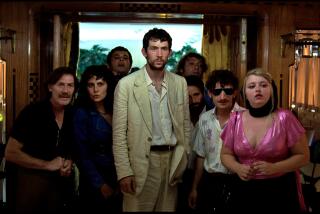A very different ‘Grace of Monaco’ in American and French versions
- Share via
Over her glittery and turbulent life, Grace Kelly divided the public, evoking admiration in some and sympathy in others.
She appears to be doing the same in death.
More than three decades after Kelly perished in a car accident on the winding roads above the Monaco coast, a new film about her life has sparked a similar debate. “Grace of Monaco,” starring Nicole Kidman and set to open the Cannes Film Festival on May 14, is at the center of a transatlantic fight between U.S. distributor Harvey Weinstein and French filmmakers Olivier Dahan and Pierre-Ange Le Pogam over the proper tone of the film.
The Weinstein version of “Grace” apparently shows Kelly’s story as a light fairy tale with a strong dose of wish fulfillment; French director Dahan and producer Le Pogam have fashioned a more melodramatic account that highlights Kelly’s hardships upon her arrival in the monarchy. The French cut of the film will be shown at Cannes’ opening night.
WATCH TRAILERS: Cannes Film Festival 2014
On one level, the fight is over distribution: If Weinstein Co. can’t come to an agreement with the film’s India-based financier, Yash Raj Films, the movie could be caught in limbo in the U.S and may not come out domestically for a year or more, if it at all. The controversy is also casting a shadow over the opening of Cannes, one of the most glamorous nights on the film calendar, which this year has added resonance given “Grace’s” local angle.
But the battle is also over a more fundamental issue — namely, who has the right to determine the legacy of an international icon.
According to several people with knowledge of the situation who declined to talk about it on the record because of the confidential nature of the discussions, Weinstein and his executives are seeking a renegotiation of an agreed-on rights fee with the film’s financier, Indian producer Uday Chopra’s Yash Raj Films, or YRF, from $5 million to $3 million, citing broken promises on the part of the French filmmakers and added costs incurred by a new cut Weinstein has made for potential U.S. release.
Neither Le Pogam, the Weinstein Co. nor a Los Angeles-based YRF executive would comment on the record about the “Grace” situation.
The battle began last spring when Weinstein, the film’s American distributor, did not like the cut delivered by Dahan, a French director best known for the 2007 Edith Piaf biopic, “La Vie en Rose,” deeming it grim and overly melodramatic. Weinstein then sent notes to Le Pogam and Dahan for a new cut while, soon after, beginning work on his own lighter version of the film that he believed would be more in line with the script the company had initially committed to.
In October, Weinstein, having worked out a new version with a team of editors over a number of weeks, showed that new cut of the movie to several Hollywood insiders. But when Dahan was sent that version he blew up and took to the media, telling French newspaper Liberacion in November: “When you confront an American distributor like Weinstein, not to name names, there is not much you can do. Either you say, ‘Go figure it out with your pile of …’ or you brace yourself so the blackmail isn’t as violent.”
Le Pogam and Dahan in the meantime worked out their own new version of the film that incorporated some of Weinstein’s suggestions but retained much of what Dahan originally had in what’s come to be known as “the French version.” (Dahan’s original director’s cut was far darker than either cut and is no longer in play.)
According to those familiar with the American and French versions, the two cuts deviate only in about five minutes’ worth of scenes — but they are crucial moments, spelling big differences in the overall tone and feel of the film.
The controversy shines a light not only on the murky world of international film financing and distribution but also on the slippery nature of film editing, in which the same script can be turned into vastly different movies.
“It is strange to have two fundamentally different movies based on one set of pages,” said Arash Amel, the film’s screenwriter who also served as one of its producers. “It almost feels like I’ve written a play and I’m seeing two different stagings of the work.”
Kelly famously met Prince Rainier while on a trip to the Cannes Film Festival in 1955 and married him the following year, leaving behind a flourishing career in Hollywood to start a new life and family on the Riviera.
The Weinstein version tells that story with a Capra-esque touch, offering a fairy tale in which an American actress travels to the principality and, despite some struggles, reinvents herself as the princess of Monaco. It also contains a fair amount of romance.
The French version, set to be released in France via Le Pogam partners Gaumont and TF1, is a darker, more tragic story in which Kelly battles with a petulant Prince Rainier soon after arriving in Monaco and is seen suffering in several moments of the film as the fairy-tale aspects are muted in favor of melodrama.
“I think every country in the world will see this story a little bit differently,” said Amel. “America and France are just the furthest apart on that spectrum.”
Many in the U.S., for instance, view Kelly, who had three children with Rainier over their quarter-century of marriage, as a happy tale of a beautiful actress living out a real-life fantasy. The French often view her more as a cautionary tale of a privately suffering victim of royal-family indifference.
After the respective cuts were made, Weinstein and Le Pogam then worked out an unusual deal in which Weinstein could release his version in the U.S. while Le Pogam and Gaumont would take their version to French theaters, the pair finalizing that agreement by the beginning of 2014. The rights sale between Weinstein Co. and Chopra’s YRF for a $5 million U.S. purchase price, meanwhile, was closed at about the same time. Tensions seemed to subside.
But the battle flared up again when Weinstein took the film off its March release date, angering the French filmmakers, who had agreed to a U.S. rollout on that date to help seed a European release later in the spring. Things grew even more heated when, shortly after, Cannes announced “Grace” as its opening-night film.
According to sources familiar with the latter development, Weinstein and his executives were blindsided by the news and furious at Le Pogam and his French partners with the news that Cannes would open the festival with the French version.
In the months following, Weinstein told YRF that he was prepared to walk away entirely — or, at most, pay $3 million with little backend incentives to release the film in the U.S. That remains the company’s position, with YRF seeking the original $5 million or, if it lowers the price, significant backend that Weinstein is not prepared to offer.
The dispute will not affect the movie’s Cannes screening. At a news conference announcing the slate last month, Cannes festival director Thierry Fremaux suggested the festival was fully behind the French version, saying that, though there were “heated discussions before the film was finished,” the version to be shown on opening night would be “the only version that the director intended to make.”
If Weinstein and YRF cannot come to an agreement ahead of the May 14 Cannes premiere, it could leave the film in limbo in the U.S. Other distributors would be wary of touching it for fear they could become entangled in legal action from the Weinstein Co., which could allege that YRF breached its deal. And the Weinstein Co. itself wouldn’t release it without an agreement over the fee.
The controversy has been marked by cultural differences and a lack of communication. For instance, despite the perception of a nasty public faceoff, Dahan and Weinstein have never met at any point during the making or editing of the movie, with the two communicating primarily via Le Pogam.
Meanwhile, all this could prove awkward for one of cinema’s biggest stars: Kidman would be part of a glitzy red-carpet celebration in Cannes that might not include her frequent professional collaborator, Harvey Weinstein, with Weinstein releasing two other Kidman films this year alone.
Screenwriter Amel said he understood how these two versions came about.
“Grace Kelly was a complicated figure,” he said. “Some will see her as a princess story and others will see her as a more tragic tale.”
More to Read
Only good movies
Get the Indie Focus newsletter, Mark Olsen's weekly guide to the world of cinema.
You may occasionally receive promotional content from the Los Angeles Times.











